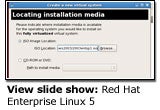Version 5 of Red Hat’s Red Hat Enterprise Linux operating system hit the streets last month, complete with a truckload of updated open-source components and brand-new support for server virtualization—courtesy of the Xen hypervisor project.
eWEEK Labs tested RHEL 5 with a particular focus on its new virtualization features. While we think that Red Hat is off to a good start with its Xen implementation, companies in search of an out-of-the-box server virtualization solution shouldn’t expect it from RHEL 5.
Compared with VMware’s VI3 (VMware Infrastructure 3) and with the Xen-based Virtual Iron and XenEnterprise products we’ve reviewed, RHEL 5’s tools for creating and managing guest machines are pretty Spartan, and our experiences installing and running Windows Server 2003 and RHEL 5 guests contained more troubleshooting and Googling than we would have liked.
However, we expect that any company looking for a general-purpose Linux operating system with solid support and lots of hardware and software certifications would be rather pleased with RHEL 5.
At sites where earlier RHEL versions are already in service, the upgrade should fit in particularly well. Red Hat’s subscription model has always meant that customers can upgrade between RHEL versions when they want, but the addition of virtualization support offers the alternative of running older versions of RHEL on a RHEL 5 box as virtual machines.
RHEL 5 supports x86 platforms, as well as Advanced Micro Devices’ Athlon 64 and Opteron; Intel’s EM64T (Extended Memory 64 Technology) and Itanium II; and IBM’s Power, zSeries, and S/390 platforms.
eWEEK Labs tested the 64-bit version of RHEL 5 on an IBM x3655 server with two dual-core Opterons and 3.5GB of RAM; we ran the 32-bit version both in a VMware ESX Server VM and in a guest instance on our 64-bit RHEL test system.
With RHEL 5, Red Hat has shuffled its SKUs around a bit—what had previously been the entry-level ES server version is now just called Red Hat Enterprise Linux. This version is limited to two CPU sockets, and is priced, per year, at $349 for a basic support plan, $799 for a standard support plan and $1,299 for a premium support plan.
